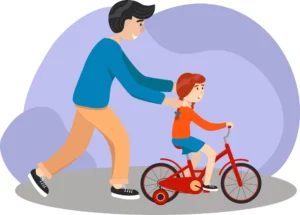Grammar
We complete all singular verb forms in our list of regular verbs:
kommen (to come)
ich komme
du kommst
er, sie, es kommt
wohnen (to live)
ich wohne
du wohnst
er, sie, es wohnt
arbeiten (to work)
ich arbeite
du arbeitest
er, sie, es arbeitet
So, with er, sie, and es, we add the ending -t to a verb. Except if it would result in strange things (like ‚arbeitt‘ with a double t). In these cases we add an extra e so the regular verb ending becomes –et.

Remember: At the moment you’re still riding with training wheels. That means, in our writing exercises it is currently no problem if you forget a punctuation mark (,.!?) or disregard upper and lower case. But that will change soon! In the future, all nouns and sentence beginnings must be written in upper case and the rest in lower case.
2 Complete the lines
If you can’t write ä, ö, ü, and ß then replace them with ae, oe, ue, and ss.
Use all the verb endings for I, you, he, she, it from the above grammar section – including the unchanged verb forms.
![]()
2 Responses
Hi,
It is confusing if “sie”mean she ot they in this exercise. Can be better specified, please?
Otherwise the solution may be full of mistakes.
Thanks,
Kalman.
Hi!
It’s specified in the exercise: “Use all the verb endings from the above grammar section”. These are the conjugations you should use. There is no “they” for example. Only I, you, he, she, and it. I added this sentence to the exercise now.
Hope that helps.
Christian